Covid 'D-Day': ICU nurse in New York among first in country to receive vaccination
"D-Day was a pivotal turning point in World War II. It was the beginning of the end — and that's where we are today," Gen. Gustave Perna said.
With the prick of a needle, the battle against Covid-19 took what could be a decisive turn Monday as the first federally approved coronavirus vaccine was injected into an American arm.
Sandra Lindsay, an ICU nurse who has been on the front lines of the battle against a virus that's killed over 300,000 people in the United States alone, joined in the applause moments after the first dose was injected into her left arm.
"I feel hopeful today, relieved," Lindsay, who works at at Long Island Jewish Medical Center in the New York City borough of Queens, said after the historic moment was livestreamed by New York Gov. Andrew Cuomo. "I feel the healing is coming. I hope this marks the beginning of the end of the very painful time in our history."
Cuomo, whose state was among the hardest hit in the earliest days of the pandemic, hailed the vaccine as "the weapon that will end the war."
"How fitting that she was the first to get the shot," New York City Mayor Bill de Blasio said of Lindsay.
Within minutes, President Donald Trump posted on Twitter: "“First Vaccine Administered. Congratulations USA! Congratulations WORLD!”
Developed by the German company BioNTech and its U.S. partner Pfizer, the Covid-19 vaccine was given emergency use authorization by the Food and Drug Administration on Friday night.
The first trucks bearing the doses departed Pfizer's plant in Portage, Michigan on Sunday and the company expects to deliver 2.9 million doses to 636 predetermined locations by the end of this week.
By Sunday evening, an American Airlines Boeing 777-200 packed with vaccines had taken off from Chicago O'Hare International Airport bound for Miami, Florida, a state that has reported more than 1.1 million cases of coronavirus, according to the latest NBC News data.
"The cavalry is on the way," Dr. Dave Chokshi, the New York City health commissioner, said Monday.
It was the start of what is shaping up to be a colossal logistical challenge, with cargo trucks and planes fanning out across the country. All the while, these vaccines must be kept at minus 94 Fahrenheit, transported to their destination in special boxes packed with dry ice.
"We now believe that the first individuals will be vaccinated here in the commonwealth tomorrow morning," Kentucky Gov. Andy Beshear said in a statement Sunday. "We are less than 24 hours away from the beginning of the end of this virus."
"Everything's on time, no disruptions, and we're very, very excited," said Wes Wheeler, president of UPS Healthcare, which along with rival FedEx is carrying out the mass deliveries.
Still, salvation is a long way off.
Most Americans won't receive the shots until well into next year. And it will take some time to make even a dent in a pandemic that is killing thousands of people across the U.S. every day — more than ever before.
Medical workers will struggle not only to distribute the vaccine to rural areas, but also to convince skeptical members of the public that the shots are safe.
Secretary of Health and Human Services Alex Azar tried to reassure Americans on Monday, telling the "TODAY" show that the vaccine had "gone through every aspect of the FDA process with integrity and transparent data."
"If you are recommended to get it and it's available for you, please do get it, protect yourself and protect those around you," he said.
Download the NBC News app for the latest news on the coronavirus
Asked exactly how may people would be vaccinated and how quickly, Azar said several times that it was "up to our nation's governors" to decide the specifics.
Over the weekend, Gen. Gustave Perna, chief operating officer of Operation Warp Speed, likened the distribution operation to the 1944 Normandy landings, the Allied invasion that began the liberation of Nazi-occupied Europe.
"D-Day was a pivotal turning point in World War II. It was the beginning of the end — and that's where we are today," Perna told a briefing Saturday. "But make no mistake, it was not the end. Months and months of hard-fought battles occurred and it took diligence, courage and strength to eventually achieve victory."
Meanwhile, Congressional leaders have set a Friday deadline to pass legislation to keep the government funded, and they say a Covid-19 aid package should be attached to it. However, Democrats and Republicans remain at odds about exactly what should be included in the deal.
The vaccine rollout in the U.S. prioritizes high-risk populations, such as hospital workers and nursing home staff and residents. It's unclear who will be prioritized in the second phase. On Monday, 145 sites will receive the vaccine, 425 Tuesday and 66 Wednesday, making up the rest of the initial shipment, he said.
That mirrors what's already happening in the United Kingdom, which last week became the first country to administer a clinically approved vaccine to patients.
That appeared to frustrate Trump, calling the FDA "a big, old, slow turtle" in a tweet Friday, and urged its commissioner, Dr. Stephen M. Hahn, to "get the dam vaccines out NOW" and "stop playing games and start saving lives!!!"
The FDA has repeatedly denied this. "We do not feel that this could have been out a week earlier," Hahn told ABC's "This Week" on Sunday. "We followed our process."
A member of Pfizer's board has also said the Trump administration passed up the opportunity to buy more of the vaccine when it had the chance.
The U.S. has ordered at least 100 million doses of the BioNTech-Pfizer vaccine, with the option to buy another 500 million. Of all the vaccines currently in development, it has put in advance orders for 800 million doses — enough to inoculate its population several times over.
-
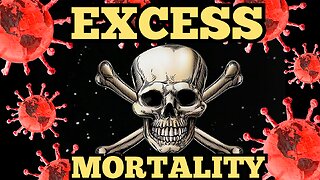 51:33
51:33
AndreCorbeil
1 year ago'COVID-19' "THE EXCESS MORTALITY RATES OF THE VACCINATED" INVESTIGATION! 'MIKE ADAMS' & 'ED DOWD'
9.33K12 -
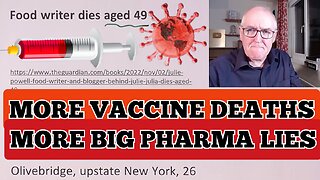 16:38
16:38
AndreCorbeil
1 year agoDr. 'John Campbell' "Excess 'Covid-19' Vaccine Deaths Continue To Rise" Like Never Before!
9.81K28 -
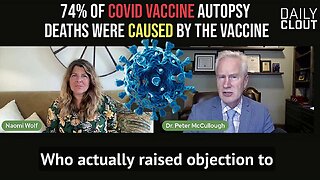 3:23
3:23
AndreCorbeil
10 months ago74% 'COVID-19' "Vaccine Deaths Found In Autopsy Review" Dr. 'Naomi Wolf's & 'Dr. 'Peter McCullough'
14.5K22 -
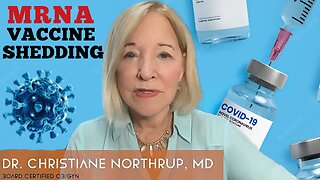 4:56
4:56
AndreCorbeil
1 year ago'Covid 19' 'MRNA' Vaccine Shedding Is Really Happening! Dr. 'Christine Northrup' OBGYN,
34.9K141 -
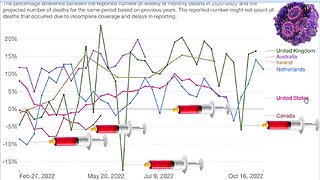 16:38
16:38
AndreCorbeil
1 year agoExcess 'Covid-19' Vaccine Deaths Continue To Rise! Dr. 'John Campbell' November 4, 2022
6.03K11 -
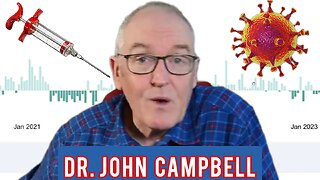 13:12
13:12
AndreCorbeil
11 months ago"Dr. 'John Campbell' 'Covid-19' Vaccines Have Caused Many Young Excess Deaths"
12.5K91 -
 1:46:04
1:46:04
AndreCorbeil
1 year ago'Vaccine Safety Research Foundation' Full Episode #54: Beating Covid in the Courts. 'V.S.R.F'
1.77K6 -
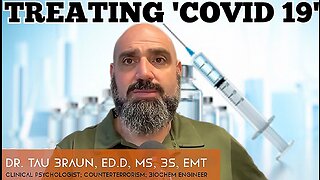 6:50
6:50
AndreCorbeil
1 year ago"Treatments For 'Covid 19' & 'MRNA' Vaccine Injured People" Dr. 'Tau Braun'
16.7K20 -
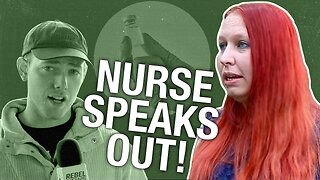 7:25
7:25
Syd Fizzard
9 months agoAre COVID vaccines really vaccines? One nurse's opinion
1281 -
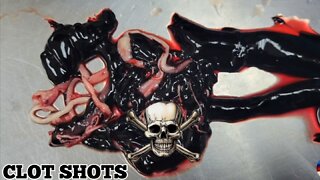 2:11
2:11
AndreCorbeil
1 year ago"95 % Of Corpses Received 'COVID-19' Vaccination Within 2 Weeks Of Death" Funeral Director Says
9.05K9